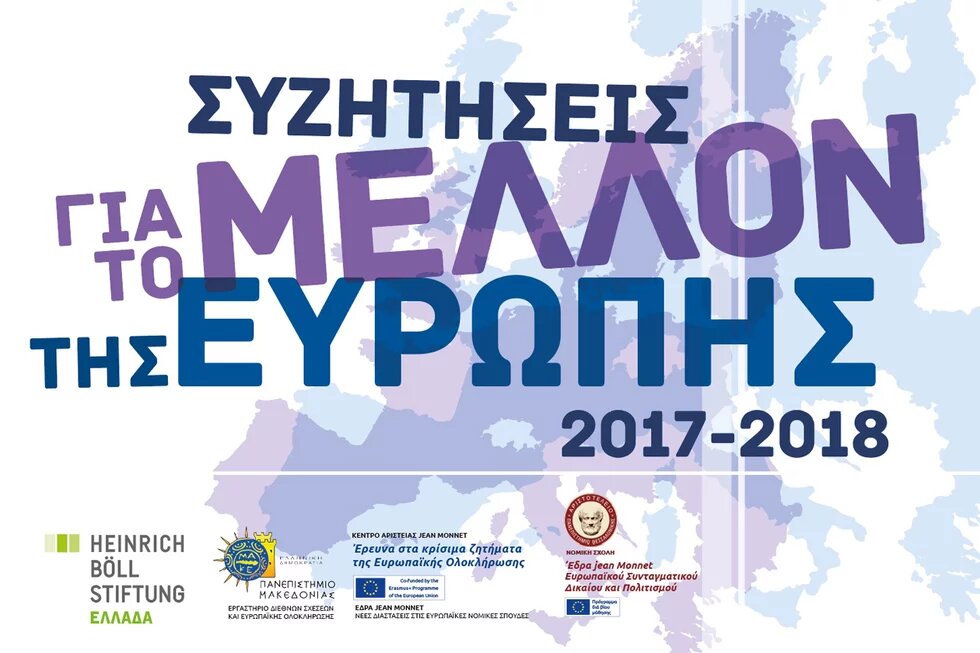Debates on the future of Europe" is a series of lectures and seminars discussing the future of the European integration. In the context of this series of debates, Professor Ulrike Liebert from the University of Bremen, gave a lecture on the subject of "Democratisation in the framework of the multilevel European governance.

"Debates on the future of Europe" is a series of lectures and seminars discussing the future of the European integration project. Crisis of the European political and economic governance model, Brexit and other breakaway tendencies of federated states and regions within nation–states culminating in the case of Catalonia, nationalist populist governments in EU member states,manifold and greatthe challenges the European Union faces in parallel with the worries of its citizens for the near future. How can the European project gain a new dynamic while preserving its cohesion? How can the united Europe continue to fulfil the promise made 60 years ago in its founding declaration, to provide prosperity, peace and freedom for all its citizens? How can the EU protect and deepen the model of liberal democracy now under fire? How can European citizens become better involved in the reform of the European Union, fixing its shortcomings and its lack of democratic legitimacy? These challenges were discussed in depth within the series of lectures and seminars “Debates on the future of Europe” jointly organized by the Heinrich Boell Foundation Greece, the Jean Monnet Chair on European Constitutional Law & Culture of the Aristotle University of Thessaloniki and the Jean Monnet Centre of Excellence of the University of Macedonia.
In the context of this series of debates, Professor Ulrike Liebert from the Jean Monnet Centre of the University of Bremen, gave a lecture on the subject of "Democratization in the framework of the multilevel European governance" on October 23, 2017. Professor Liebert gave a public lecture and participated in a 3-hour seminar with a limited number of participants, academic researchers and graduate students who work and study on different aspects of European integration in various university faculties. Around 100 participants, mostly young students from Thessaloniki universities, found their way to the lecture.
In her keynote speech Professor Ulrike Liebert gave a quite optimistic outlook on Europe’s future. In particular, she referred to the electoral victory of Emanuel Macron and his pro-European reform agenda in the run-off for the French presidency. Professor Liebert focused on Macron’s proposal for the establishment of a eurozone Parliament with a eurozone budget whose meaningful majority votes should overcome the current mode of intergovernmental crisis management and strengthen legitimacy and European citizen’s participation.
Profesor Lieberts´ lecture was followed by interventions from
- Ioannis Papadopoulos, Associate Professor Department of International & European Studies, University of Macedonia
- Despoina Anagnostopoulou, Associate Professor Department of International & European Studies University of Macedonia
- Giorgos Andreou, Assistant Professor Faculty of Political Sciences, Aristotle University of Thessaloniki
- Lina Papadopoulou, Associate Professor, Faculty of Law, Aristotle University of Thessaloniki
The following day, the discussion on innovating European governance continued more in depth among the students and the speakers at a seminar held at the Aristotle University of Thessaloniki. In line with the proposal for a Eurozone Parliament suggested by Professor Liebert, the participants discussed conditions required for the establishment of this new European institution, as well as its advantages and disadvantages. A main precondition for a new Eurozone Parliament taking over responsibility for crisis management would be the entitlement of this new parliament to take meaningful decisions and restricting the current jurisprudence of the European Court of Justice to fundamental issues, thus transferring competences for policy decisions to the Eurozone Parliament.
Some of the advantages of a Eurozone Parliament would be a greater legitimacy of decisions, preparing the ground for them to become binding, rather not the case in the EU so far-particularly with regard to intergovernmental decisions such as the European Fiscal Compact- as well as an increased ability to intervene in the economy and the financial market. The main disadvantage identified is the increase of the complexity in the EU institutional structure, posing an obstacle to transparency and democracy. Moreover, from the point of view of the economic policy model applied in Germany (less state-run companies, less political interventions and the supremacy of self-regulated markets), a more politicized economic policy model (like the French or the Greek) would run the risk of hampering structural change, preserving old structures and interests. The discussion also revealed that the support for reform of the European institutions, very much depends on each country’s economic model vested upon particular national interests.
The events organized were successful with the participants expressing interest to follow-up on these debates and fruitful discussions.
Watch the video of the public Lecture below